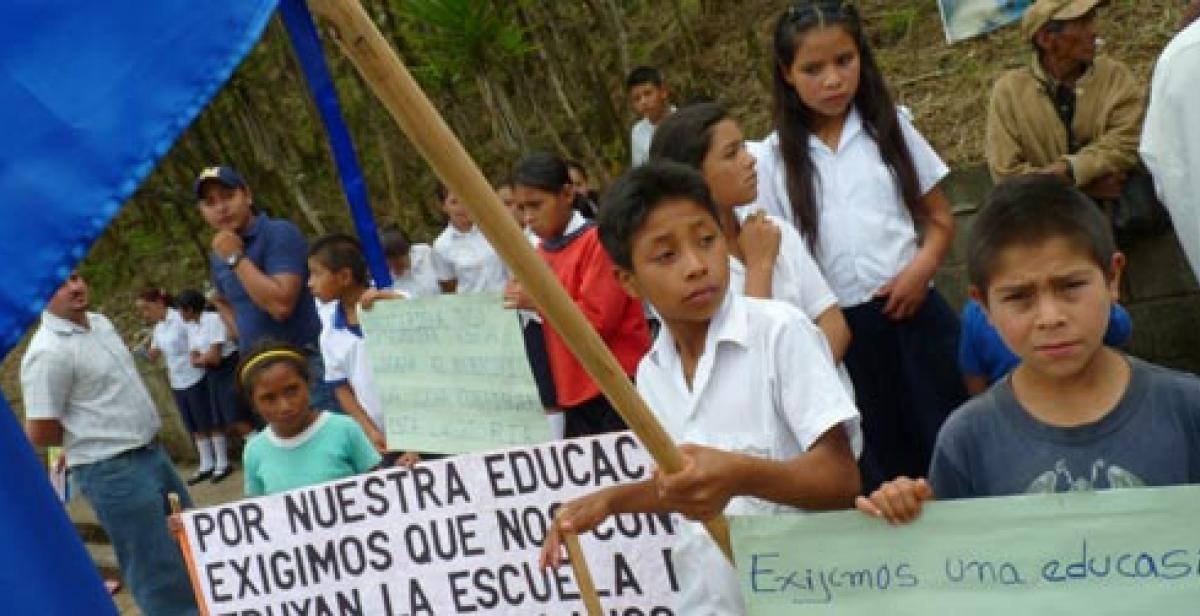Yesterday I visited some Progressio partners in the place known as Nahuaterique in Honduras. Set high up in the mountains bordering El Salvador, the lush fields of maize, interspersed between a mixture of pine and deciduous forest, belie the fact that many of the 7,000 or so inhabitants are in fact malnourished, only 250 of the 4,000 children can go to school, and the whole population is effectively stateless – and has been for more than 18 years.

Until the 1980s this area had been part of El Salvador (the inhabitants have Salvadorean nationality). But following a ruling at the Hague in 1992, intended to resolve the territorial dispute between the two countries, it passed to Honduras.
But no one has taken any responsibility for the community that lives there. So there is no municipal council to provide any of the municipal services that one might expect even at a most basic level.
There is no health care and only minimum education (a primary school only). The road leading to the area from the nearest town Marcala has been maintained by the El Salvador authorities, as the mayor of the municipality just over the border in El Salvador is supporting Nahuaterique´s efforts to improve their lot. But in Honduras, the inhabitants are not represented and so not consulted or involved in any of the decisions anyone else makes in the area that might affect them.

So what is Progressio doing about all this?
Their plight came to Progressio’s attention just a few years ago when an Irish development worker married a woman from Nahuaterique and determined to help them. Now a team of four Progressio development workers based in Marcala (Honduras) work in different ways to support this community.
Malnutrition and poverty (mainly because of unicropping) are being tackled through Progressio’s well developed agro-ecology model, which involves training and working with local producers to diversify the crops they grow (improves diet), to grow them organically (better for their health) and to produce their own organic fertilisers and pest control (dispenses with the need to buy expensive chemical fertilisers and pesticides).
Food and water
They work in smallish groups, first with a trial plot that is used as a field school and worked together. After the first crop cycle (there are 3 or 4 cycles a year) they apply what they have learnt to more land and bring more producers to benefit. Special attention is paid to ensuring that women are also trained and take part, because as there are many single parent households headed by women, it is essential for their and their families’ survival.
Their water problems in the dry season are starting to be addressed with an irrigation project. The development workers work with them to obtain the materials (pipes, cement etc) and then assemble the irrigation system to ensure a water supply to the fields throughout the year.
There is no shortage of water in the area, with rivers and water sheds, but access to these quite abundant sources of water has been non-existent. Progressio has helped the people of Nahuaterique and other neighbouring communities to build their irrigation systems, carrying heavy pipes many miles on foot up mountain sides to the source of the water.
How to be a citizen
The people of Nahuaterique are currently in the process of registering themselves as a key part of having their community registered by the state as a municipality. Another of our development workers is supporting them in this work and we are hoping Digicel (the mobile phone company which is supporting Progressio’s work in Honduras) may be able to offer them the benefits of their extensive experience of dealing with every municipality in the country as well as with central government in order to extend their mobile network across the country.
Becoming citizens and members of an official municipality will open up opportunities that they cannot currently take advantage of. Miles from anywhere else, their natural market for any excess produce they manage to harvest is just over the border in El Salvador. The smallest country in Central America, it is also densely populated, and El Salvadoreans living in that border area provide the perfect market for the people of Nahuaterique.
Or at least it will do once they have papers that allow them to go over the border legally and safely. Right now they are likely to be challenged as potential drug traffickers by the Salvadorean police patrolling the border.
Visiting this community gave me a very rounded picture of the whole range of work and issues that affect marginalised and therefore powerless communities – and how Progressio through its ‘cooperantes’ (development workers) is working alongside them in solidarity to overcome these barriers that keep them poor.
Sarah Sandon is Progressio’s Head of Fundraising. The development workers working alongside the people of Nahuaterique are Eli Escoto (agronomist), Roger Diaz (agro-ecologist), Marvin Zavala (agro-ecologist), and Jose Abel (helping them sort out registering inhabitants and becoming a municipality).
Photo at top: Young people in Nahuaterique during an awareness day held in June 2010 calling for recognition of the people’s municipality. (Photo © Nuria Zayas/Progressio)
Other photos from Nahuaterique © Yasmin Reyes/Progressio



